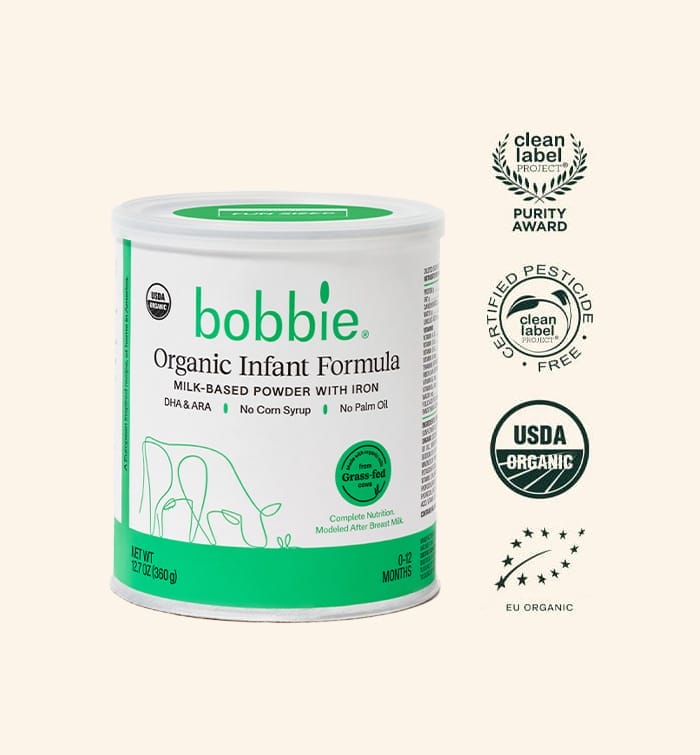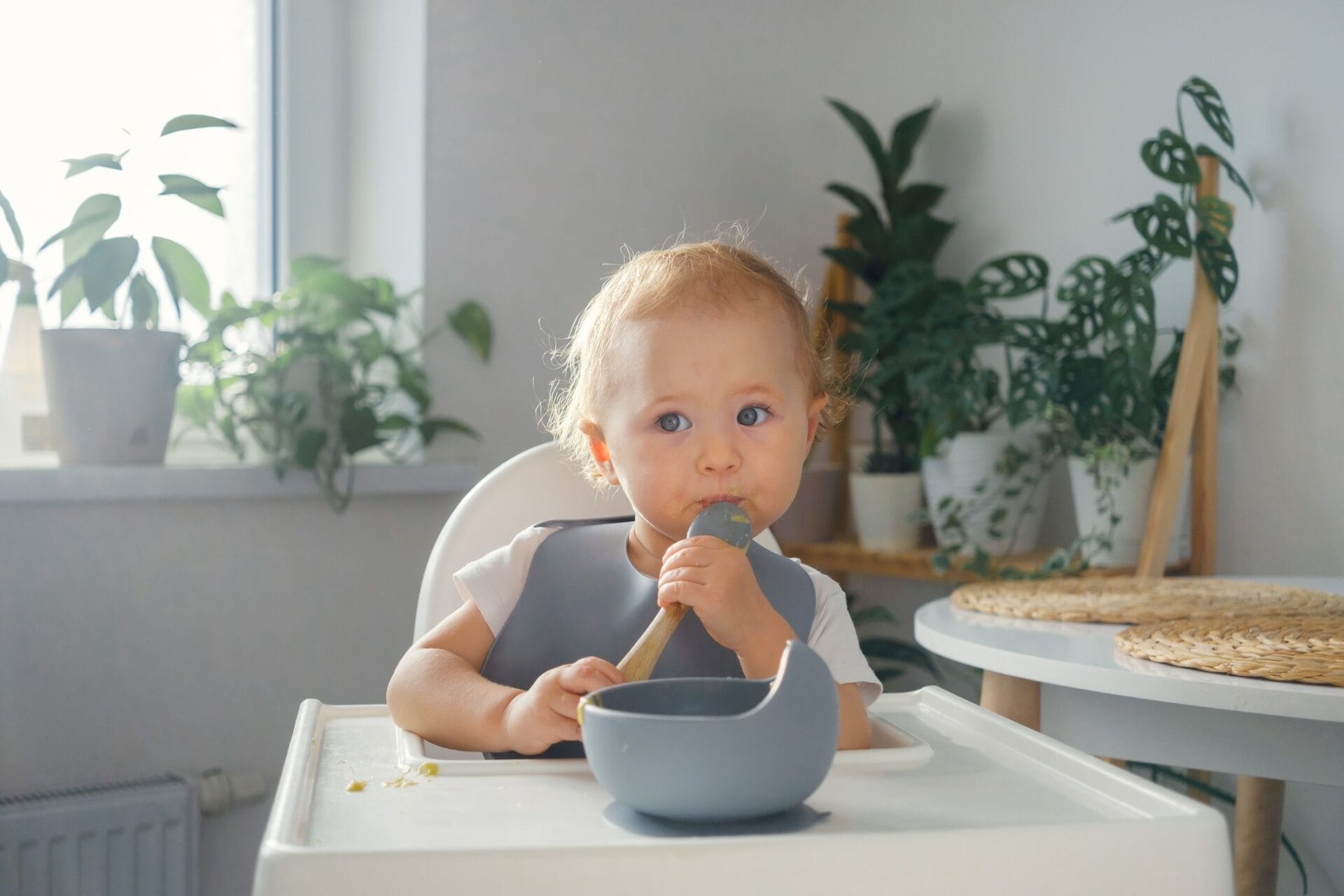We are proud to say that these posts are not sponsored. Our editorial team of Bobbie moms and writers personally select each featured product. If you buy something through our links, we may earn an affiliate commission, at no cost to you.
When it’s time to add safe solid foods for baby into your little one’s diet on top of breastfeeding or formula feeding, it can feel like all you do is feed them. It’s a lot— we totally get it, and we’ve been there ourselves. Not to worry, though. We’re here to help you get through this phase like a pro.
An 8-month-old baby is still getting the majority of their vitamins, minerals and key nutrients needed for growth from formula or breast milk. That makes the 8 month mark a great time to start setting the foundations for healthy eating habits with a wide variety of nutritious foods that they will rely on when they move away from bottle or breastfeeding.
Every family will find the feeding schedule that works best for them, but it may include a nursing session or bottle feed around breakfast, lunch, dinner and bedtime, along with solid foods at regular mealtimes and snack times. Exact times will be different for each family— some babies may prefer to eat lunch at 11 a.m., while others may not be ready until 12:30 p.m.
A feeding schedule for an 8 month old can look a lot of different ways. We’ve got three examples that have worked well for us and our friends. It can be helpful to offer solids before breastfeeding or bottle feeding so that baby is open to trying them before they fill up on breast milk or formula.
- Your Baby’s Growth at 8 months
- How many feeds should an 8-month-old have?
- How often and how much should an 8-month-old eat?
- How many times a day should I feed my 8-month-old solids?
- What is a good eating schedule for an 8-month-old?
- How much water should an 8-month-old drink?
- 3 sample meal plans for your 8 month old
- Meal planning for an 8 month old

Shop Bobbie Organic Infant Formula
Bobbie Organic Infant Formula is a USDA Organic, EU-style infant formula that meets all FDA requirements. It is a complete nutrition milk-based powder modeled after breast milk and is easy on tummies. It is non-GMO and doesn't have corn syrup, palm oil, or maltodextrin. Learn more about Bobbie.
Your Baby’s Growth at 8 months
By 8-months-old, your baby has now moved beyond eating only strained/pureed foods and can practice finger-feeding themselves— with soft, mashed and age-appropriate foods. At this age, they should be enjoying a mix of solids with breast milk and/or formula. Every child is different, but an average 8-month-old baby weighs between 17-22 pounds.
Hopefully, at this age your little one will sleep through the night (or is getting close!), giving you a little break from the round-the-clock feeding of the earlier months. Your baby may also be hitting some new and exciting 8 month milestones like sitting without support, rolling over, crawling or scooting, and possibly pulling up, standing and cruising alongside furniture.
You may also notice that baby is getting shy or clinging to you around unfamiliar people and may cry when you leave. This is the start of separation anxiety, and it’s completely normal. It doesn’t last forever, either. Separation anxiety typically peaks between 10 to 18 months old.
How many feeds should an 8-month-old have?
Most 8-month-olds will need to eat around six times a day, for about three meals and three snacks, including nursing sessions and/or bottle feeding.
How often and how much should an 8-month-old eat?
Whether you are formula feeding or breastfeeding, babies between 8 to 12 months should be eating solid food, too. A typical feeding schedule for an 8-month-old will look like three meals and three snacks throughout the day.
The American Academy of Pediatrics recommends that babies at this age get around 750-900 calories a day. A little more than half of those calories (think: 400-500) should come from breast milk or formula. This equates to about 24 ounces of formula or breast milk, or around four 6-ounce bottles throughout the day.
An example of an average 8-month-old meal includes:
- 2-4 ounces of pureed, mashed or diced fruit or vegetables
- 2-4 ounces of yogurt or cottage cheese
- 2-4 ounces diced poultry, meat, or tofu
- 4-6 ounces of breast milk or formula
How many times a day should I feed my 8-month-old solids?
At 8-months old, your baby’s primary source of nutrition is still breast milk and/or baby formula. But solid foods are starting to make up a bigger part of their diet.
Aim to serve your 8-month-old solids anywhere from 3-5 times a day. You may need to work up to this one meal at a time, and be sure to watch baby’s hunger and fullness cues to help guide you.
What is a good eating schedule for an 8-month-old?
The best feeding schedule is the one that works for you.
The exact times of day may vary, but a good eating schedule for an 8-month-old will include breakfast, morning snack, lunch, afternoon snack, dinner, and pre-bedtime snack. Since you and baby are likely already settled into a regular formula or breast milk feeding routine, you may find it easiest to plan their eating schedule around that.
How much water should an 8-month-old drink?
Until your baby turns 1, they don’t need extra water because breast milk and formula provide all the hydration they need.
That said, if you do want to introduce water, talk to your pediatrician first. They may recommend you start by offering it in small amounts—like 2 to 3 ounces—and keep it under 1 cup (8 ounces) per day. This can be a good time to offer a sippy cup to get them comfortable with drinking out of it.
3 sample meal plans for your 8 month old
When your baby is around 8-months-old, you can offer them a range of age appropriate safe foods, including finger foods, that require a bit more chewing than pureed baby food. Since 8-month-olds are still getting the hang of eating, chewing and swallowing, make sure to serve soft, mashed or lightly pureed options.
Try to feed baby a variety of foods that will help them get familiar with new tastes, textures and smells. When you are introducing new foods to your baby, try to do so one food at a time to help identify any food allergies. Generally, experts recommend waiting at least four days between introducing new foods.
Meal Plan 1 for your 8 month old
Breakfast:
- Breast milk or 6 ounces formula
- 1 mashed or scrambled egg
- 1/4-1/2 cup mashed banana
Morning Snack
- 2 to 4 ounces pureed or diced broccoli
Lunch
- Breast milk or 6 ounces formula
- 2 to 4 ounces pureed or diced meat
- 2 to 4 ounces pureed or diced carrots
Afternoon Snack
- 1 whole grain cracker
- 2 to 4 ounces yogurt
Dinner
- Breast milk or 6 ounces formula
- 2 to 4 ounces diced chicken
- 2 to 4 ounces cooked green beans (diced or mashed)
- 2 to 4 ounces cooked soft-whole grain pasta
- 2 to 4 ounces diced or mashed blueberries
Bedtime Snack
- Breast milk or 6 ounces formula
Meal Plan 2 for your 8 month old
Breakfast
- Breast milk or 4 ounces formula
- 2 to 4 ounces cereal
- 2 to 4 ounces mashed or diced strawberries
Morning Snack
- Breast milk or 4 ounces formula
- 2 to 4 ounces pureed or diced cauliflower
Lunch
- Breast milk or 4 ounces formula
- 2 to 4 ounces cottage cheese
- 2 to 4 ounces pureed corn
Afternoon Snack
- Breast milk or 4 ounces formula
- 1 teething biscuit
- 2 to 4 ounces fork-mashed or diced peaches
Dinner
- Breast milk or 4 to 6 ounces formula
- 2 to 4 ounces diced tofu
- 2 to 4 ounces mashed peas
- 2 to 4 ounces mashed potatoes
- 2 to 4 ounces diced or mashed raspberries
Bedtime Snack
- Breast milk or 4 to 6 ounces formula
Meal Plan 3 for your 8 month old
Breakfast
- Breast milk or 4-6 ounces formula
- 2 to 4 ounces oatmeal
- 2 to 4 ounces mashed or diced avocado
Morning Snack
- Breast milk or 4-6 ounces formula
- 2 to 4 ounces diced cheese
Lunch
- Breast milk or 4-6 ounces formula
- 2 to 4 ounces yogurt
- 2 to 4 ounces pureed or diced soft butternut squash
Afternoon Snack
- Breast milk or 4-6 ounces formula
- 1 whole grain cracker
- 2 to 4 ounces fork-mashed or diced pears
Dinner
- Breast milk or 4-6 ounces formula
- 2 to 4 ounces diced salmon
- 2 to 4 ounces mashed or diced soft zucchini
- 2 to 4 ounces whole grain pasta
- 2 to 4 ounces diced or mashed kiwi
Bedtime Snack
- Breast milk or 4-6 ounces formula
Meal planning for an 8 month old
As solids start playing a bigger role in their diet, the majority of your little one’s nutrients will still come from breast milk and formula. Now is a good time to introduce them to a wide variety of wholesome and nutrient-dense foods that will fuel their growth as they get older.
Watching your baby’s hunger and fullness cues will help you and baby work together to find the right feeding schedule for you. It may take some time and schedule adjustments, but before you know it, you’ll both be pros at this new phase. Once you’ve mastered this moment, here’s a guide to feeding a one year old, you’re almost here!

